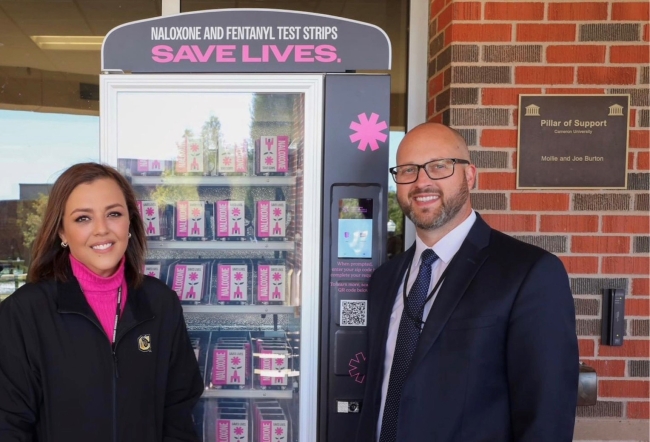You have /5 articles left.
Sign up for a free account or log in.

Jennifer Rowland (left) and Oklahoma district attorney Kyle Cabelka stand by Cameron University’s new harm-reduction vending machine at its debut.
Cameron University
Over 200 doses of Narcan, a medication in the form of a nasal spray that can reverse an opioid overdose, have been distributed from a vending machine on the campus of Oakland University in Michigan in the six months since the machine was installed.
That doesn’t mean all those doses have been used. But the vending machine allows students, faculty members and anyone who visits campus free and easy access to the drug, which public health officials are urging the public to keep on hand on the off chance they ever encounter someone experiencing an overdose.
Opioid—specifically fentanyl—deaths are not a major problem on Oakland’s campus, although Lieutenant Nicole Thompson of the Oakland University Police Department said her team, which is trained to use naloxone, the generic name for Narcan, has administered the drug on more than one occasion. But in surrounding Oakland County, located just outside Detroit, overdose deaths have been increasing in recent years, climbing 68 percent from 2019 to 2021, the most recent year for which data are available.
Thompson said the university first introduced programs to support individuals with substance-use disorder in fall 2022, starting with an initiative called Hope Not Handcuffs that connects those individuals, via the campus police department, with volunteers who can help them access treatment and other resources. Students studying social work then reached out to the police department about possibly installing a harm-reduction vending machine on campus.
The police department agreed and worked with Oakland County’s health department to secure a vending machine and place it inside the university’s student union building. The county covered the cost of the machine, as well as maintenance and product-refill costs.
“It’s just another resource available to our students, faculty and staff,” Thompson said. “We know most people with a substance-use disorder are silently struggling, and it’s made to give them another resource until they’re ready to get help.”
The term “harm reduction” refers to practices that reduce the negative impact of drug use. Access to Narcan, for example, makes it less likely an individual will die of an overdose. Similarly, access to fentanyl test strips, which are also available in OU’s vending machine and can detect traces of the highly potent drug, helps users know more about what substances they are ingesting.
Rebecca E. Stewart, professor of psychiatry at the Hospital of the University of Pennsylvania, said harm-reduction vending machines are commonplace in many other countries—often distributing products that are significantly more controversial than Narcan, such as sterile needles for injecting drugs—but have only begun cropping up in the U.S. in the past five to 10 years.
One of the key benefits of making products like naloxone available in vending machines versus over the counter at a pharmacy is the anonymity it provides.
“It provides an access point for individuals who may not want to … go to their doctor’s office,” she said. “[They] often face a lot of stigma in the treatment system, and there’s also stigma around harm-reduction materials.”
These vending machines are also often placed in public spaces that a person can access at any time of the day, in contrast with a pharmacy or doctor’s office, which have limited hours.
Oakland isn’t the only university that has deployed a Narcan vending machine on its campus. Cameron University, a small public institution in Oklahoma, unveiled its vending machine two weeks ago as a first step in an ongoing effort to provide more campus resources for individuals struggling with substance-use disorder. Like Oakland’s machine, Cameron’s also includes fentanyl test strips, which the state legalized just last year.
Jennifer Rowland, director of Cameron’s Student Wellness Center, said she reached out to Oklahoma public health officials after hearing that harm-reduction vending machines were being placed around the state and requested that one be placed on campus. The cost was covered entirely by the state, which will also cover product refills.
“It’s a great gift, because all we have to do is provide the electricity for it,” she said.
Heather Benke, the treasurer for Cameron’s Student Government Association and a junior, called the machine “a great resource for students who have parents or family or friends going through something.”
But she also emphasized that resources that are available on Cameron’s campus are likely to have a ripple effect on surrounding Comanche County, which saw a 48 percent increase in drug overdose deaths from the periods of 2012–2016 to 2017–2021.
“We have a lot of nontraditional students, so not a lot of our students live on campus,” she said. She predicts the vending machine’s impact will be felt more “in the Lawton community than it would be on campus, because students usually don’t stay here. They come here, they go to classes and then they go home … I think someone who knows someone who knows someone from Cameron University could use [the vending machine] without anyone questioning anything.”
On both campuses, there is a secondary goal to putting the machines on campus, beyond actually distributing Narcan and fentanyl test strips. Having the products available in such a prominent, public space—and seeing fellow students and employees taking them—goes a long way toward educating the rest of the campus community about harm reduction and reducing stigma.
Stewart, the Penn professor, said she’s found in her research into best practices for deploying harm-reduction vending machines that many proponents of the vending machine believe they are most effective when they are not limited to areas that are known hotbeds for drug use.
“‘Put them everywhere. Put them in city hall,’” she recalled survey respondents telling her. “That decreases the stigma by making them seem commonplace.”




